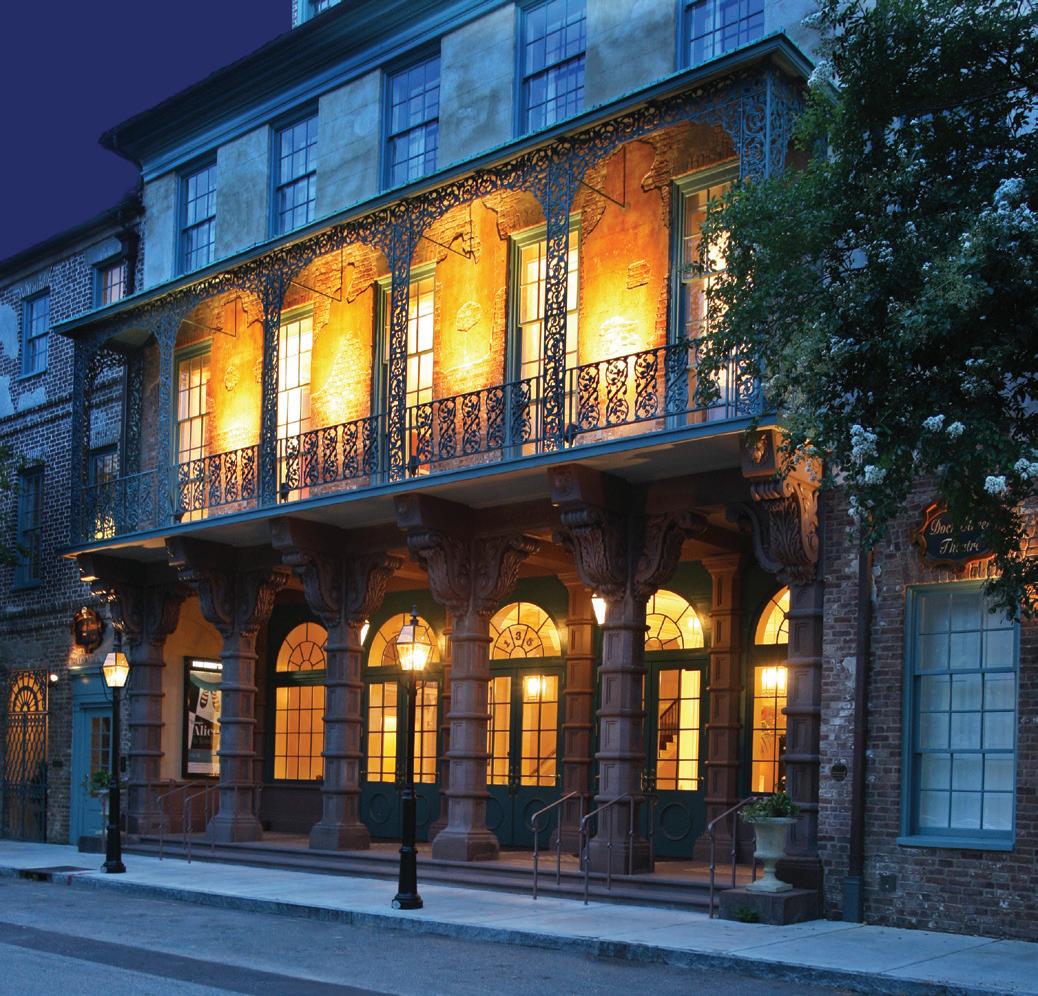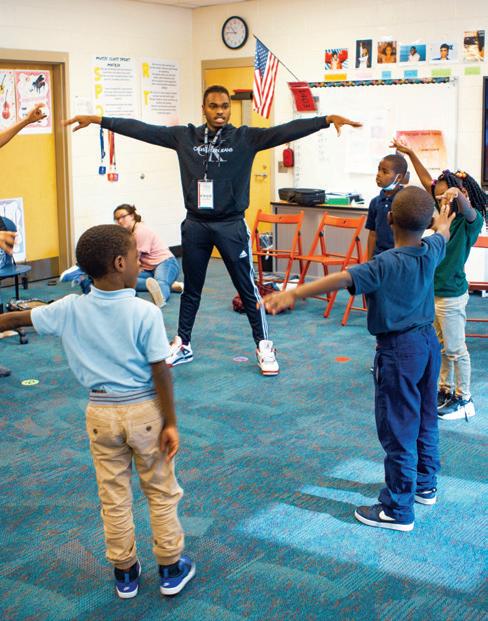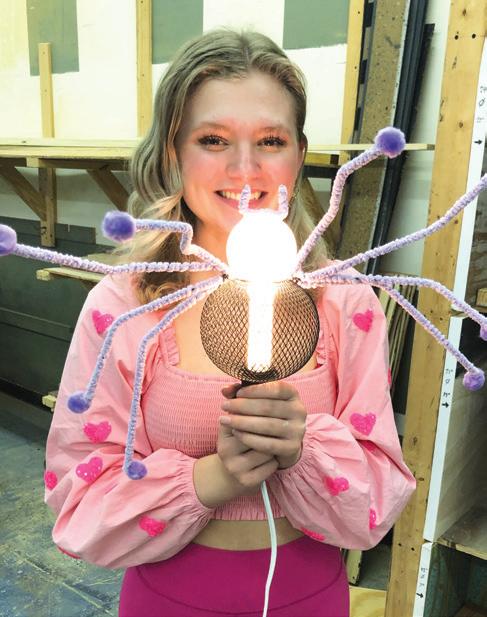
“Traditions, traditions. Without our traditions, our lives would be as shaky as... as... as a fiddler on the roof!”
Charleston Stage, now celebrating its 47th Season, is South Carolina’s largest professional theatre company in residence at the Historic Dock Street Theatre. Charleston Stage’s acclaimed full-scale productions light up the stage with stunning scenery, dazzling costumes, and brilliant lights! Productions feature a Professional Resident Acting Company and over 100 professional actors, singers, designers and theatre artists. All performances take place at the Historic Dock Street Theatre, “America’s First Theatre,” in the heart of downtown Charleston.
TABLE OF CONTENTS
3 Brief Synopsis and Characters
4-5 Background Info: The Creative Team
5 Fun Facts 5 Content Warning
6-7 Dock Street Theatre
8 Theatre Education

Based on Sholem Aleichem Stories by Special Permission of Arnold Perl
Book by Joseph Stein
Music by Jerry Bock
Lyrics by Sheldon Harnick
Produced on the New York Stage by Harold Prince
Original New York Stage Production Directed and Choreographed by Jerome Robbins
FIDDLER ON THE ROOF is presented through special arrangement with Music Theatre International (MTI). All authorized performance materials are also supplied by MTI. www.mtishows.com
Direction by Marybeth Clark
Music Direction by Sam Henderson
Choreography by Cara Dolan
BRIEF Synopsis
This timeless production, celebrated for its humor and warmth, is a cornerstone in the musical theatre canon. Fiddler on the Roof won nine Tony Awards, solidifying its status as a universally acclaimed musical that has resonated with audiences worldwide. The story unfolds in the small village of Anatevka where a poor milkman, Tevye, navigates the complexities of sustaining religious traditions amid drastic cultural changes and political upheaval in his vibrant Jewish community. As social norms shift and anti-Semitism escalates in Imperialist Russia, Tevye’s journey becomes a poignant exploration of love, faith, and the endurance of cultural roots. Featuring an unforgettable score that includes “Sunrise, Sunset,” “If I Were a Rich Man,” and “Matchmaker, Matchmaker,” Fiddler weaves a powerful tapestry of emotions and human experiences that continue to captivate audiences today.
CHARACTERS
TEVYE: The Dairyman
GOLDE: Tevye’s Wife
TZEITEL, HODEL, CHAVA: Tevye’s daughters
SHPRINTZE, BIELKE: Tevye’s daughters
YENTE: The Matchmaker
MOTEL: The Tailor
PERCHIK: The Student
LAZAR WOLF: The Butcher
MORDCHA: The Innkeeper
RABBI
MENDEL: The Rabbi’s son
AVRAM: The Bookseller
NACHUM: The Beggar
GRANDMA TZEITEL
FRUMA-SARAH CONSTABLE
FYEDKA
SHAINDEL: Motel’s Mother
THE FIDDLER VILLAGERS
the creative team



Sholem Aleichem (Author)
Sholem Aleichem (1859-1916) was a prolific Yiddish writer celebrated for his humorous and poignant portrayals of Jewish life in Eastern Europe. Born Solomon Naumovich Rabinovich in Ukraine, he adopted the pen name “Sholem Aleichem” (meaning “peace be with you” in Yiddish). His works, including the beloved character Tevye the Dairyman, explored themes of family, tradition, and the challenges of Jewish identity amidst modernity. Aleichem’s writing, filled with wit and insight, remains a cornerstone of Yiddish literature, cherished for its humor, humanity, and enduring cultural relevance worldwide. Sholem’s stories of Tevye and his family inspired Fiddler on the Roof.
Joseph Stein (Book)
Joseph Stein (1912-2010) was a celebrated American playwright and librettist, best known for his Tony Award-winning work on the musical Fiddler on the Roof (1964). Born in New York City, Stein’s collaboration with composer Jerry Bock and lyricist Sheldon Harnick produced one of Broadway’s longest-running hits, exploring themes of family and tradition. His talent for capturing the human experience through humor and poignant storytelling cemented his legacy in American theater. Stein passed away on October 24, 2010, leaving behind a lasting impact on musical theater history.
Sheldon Harnick (Lyrics)
Sheldon Harnick, born on April 30, 1924, in Chicago, Illinois, is a revered American lyricist and songwriter. Best known for his collaborations with composer Jerry Bock, Harnick achieved widespread acclaim for his work on the iconic musical Fiddler on the Roof (1964). His poignant lyrics and ability to capture the essence of characters and emotions have left an indelible mark on Broadway. Harnick’s contributions to musical theater extend beyond Fiddler, encompassing a diverse range of successful productions. His work continues to be celebrated for its depth, wit, and enduring cultural resonance in the world of musical theater.

FUN Facts
Jerry Bock (Music)
Jerry Bock (1928-2010) was a celebrated American composer known for his influential contributions to Broadway musicals. Born in New Haven, Connecticut, Bock’s collaboration with lyricist Sheldon Harnick produced iconic scores for Fiddler on the Roof (1964) and Fiorello! (1959), which won him a Pulitzer Prize. His melodic richness and emotional depth continue to resonate in musical theater, solidifying his legacy as a key figure in Broadway history.
• Fiddler on the Roof held the record for the longest-running Broadway musical for nearly 10 years, from 1964 until 1972, when it was surpassed by Grease.
• The musical is based on “Tevye and His Daughters” (also known as “Tevye the Dairyman”) by Sholem Aleichem, a series of stories about a Jewish milkman and his family living in a shtetl in Imperial Russia.
• It won nine Tony Awards in 1965, including Best Musical, Best Actor for Zero Mostel (Tevye), Best Actress for Maria Karnilova (Golde), and Best Director for Jerome Robbins.
• Language Adaptations: Fiddler on the Roof has been translated into numerous languages and performed worldwide, making it one of the most globally recognized musicals.
• Revivals: The musical has seen several successful revivals on Broadway, including notable performances by Alfred Molina as Tevye in 2004 and Danny Burstein in 2015.
• Iconic Songs: The score includes memorable songs such as “Tradition,” “Matchmaker, Matchmaker,” “If I Were a Rich Man,” and “Sunrise, Sunset,” which have become standards in musical theater.
CONTENT WARNING
Fiddler on the Roof addresses themes of religious persecution, poverty, and historical violence. It contains depictions of anti-Semitic attitudes and moments of emotional intensity, including scenes involving forced eviction and exile. Additionally, the musical touches upon themes of arranged marriage, generational conflict, and societal pressure, which may be sensitive or triggering for some viewers. Viewer discretion is advised.





